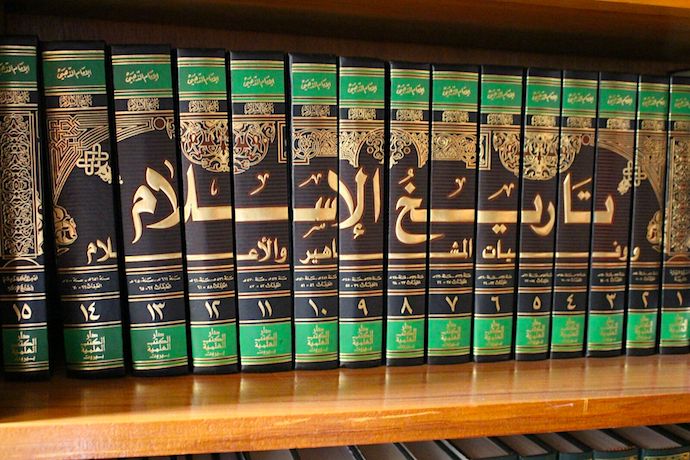When it comes to Roe v. Wade, some pro-choice voices have a jihadism problem. Posting about “Shariʿa” won’t help them. Critiquing originalism might.
A subset of those infuriated by the leaked draft of a Supreme Court opinion that would overturn fifty years of abortion jurisprudence sought to express their disgust and outrage at the Christian Right and its project by drawing comparisons to Islamic law (Shariʿa), to al-Qaʿida, and to the Taliban.
This isn’t uncommon. Several months ago, after the passage of Texas Senate Bill 8 (SB 8), author Stephen King tweeted, “The Taliban would love the Texas abortion law.”
Such usage, Sajida Jalalzai wrote on RD, is not only a perpetuation of Islamophobic beliefs, but is also a “refusal to acknowledge white Christian nationalism at the heart of anti-abortion legislation in America.” Such posts minimize the plurality of Muslim debates on the same.
While I agree that such posts reinforce Islamophobic narratives, as a scholar studying at the intersection of Islamic law and contemporary Jihadist movements, I argue that such posts also minimize faith-based critiques of the originalist legal philosophy of the current Supreme Court majority.
Much as Justices Samuel Alito, Amy Coney Barrett, Neil Gorsuch, Brett Kavanaugh, and Clarence Thomas claim that the most sound of judicial interpretations are those grounded in the intent, language, and custom of the original lawgivers and their communities, so too do many of their conservative supporters affirm a biblical literalist worldview. Through this originalist-literalist fusion, Austin Lee Steelman argues here on RD, what seemed an evangelical counter-cultural narrative is now emerging as the centerpiece of a minoritarian upheaval of U.S. law.
There is, however, another group of jurists affirming an “originalist” approach with whom they’d otherwise disagree: al-Qaʿida. And, surprisingly, while al-Qaʿida’s jurists might agree with the Court’s originalism as a guiding principle, they’d likely disagree on its approach to abortion—even with their literalist reading of the Qurʾan.
For some al-Qaʿida jurists, ensoulment—similar to colonial North America’s idea of “quickening”—creates a permissible condition for abortion if undertaken before the four-month mark of a pregnancy.
Al-Qaʿida is a Jihadi-Salafi movement. In their legal interpretations of Islamic legal sources, Jihadis justify their violent campaigns against innocent communities as acts of self-defense from a global, multicultural, secular worldview. What they seek to protect is what they believe to be an experience of Islam as lived by the prophet Muhammad, his companions, and his followers—collectively referred to in Arabic as the Salaf.
Much as several Supreme Court Justices parse early dictionaries, speeches, and essays to derive what they believe is original constitutional intent, so too do Jihadis argue that the Salaf serve as the authors of the original intent of the Shariʿa.
On the matter of abortion, two al-Qaʿida sympathetic jurists are clear. From 2010-2012, they published fatwas answering questions on the matter of abortion. A fatwa is best thought of as legal advice (contrary to popular misunderstandings of the term that arose from the Rushdie affair).
The first of these asked the jurists about an unplanned pregnancy that may have threatened the health of the mother. In an originalist move, claiming the authority of the Salaf, the jurists argued that any abortion, undertaken before ensoulment, was permissible if there was a fetal deformity or threat to the mother. This applied, agreed the second jurist, in the case of rape or assault—even, in some cases, after ensoulment. Further, he argued, the woman should receive continued therapy and affirmative communal support.
This view on abortion is not specific to al-Qaʿida. As Saʿdiyya Shaikh’s work suggests, Muslim jurists would not find these debates on abortion unfamiliar, though these jurists certainly reject the jihadist project. Jihadi jurists justify violence against numerous innocent Muslim and non-Muslim communities—and, specifically, against women. Their position on abortion neither grants them progressive status nor suggests their broader agreement with Muslim jurists and laypersons who reject the Jihadi idea of Islam altogether—and that’s essential to understand.
Of those many substantial rejections of Jihadists made by Muslims, several emphasize the Jihadist originalist interpretation of the Shariʿa as foreclosing on the pluralities of the Islamic legal tradition. By critiquing Jihadist projects, many Muslim communities demonstrate that critiquing originalism and literalism—as political and theological projects—does not require condemning religion altogether. Instead, they contend that critiquing Jihadist originalist interpretations reveals an impoverishment of Islamic traditions for shallow, punitive political gain.
Those screaming “Shariʿa” or “al-Qaʿida” at the U.S. Supreme Court’s leaked decision would do well to remember that even al-Qaʿida’s originalist project permits abortions. Could originalists in the U.S. agree? Justice Samuel Alito, answering negatively, claims in his draft opinion that “the inescapable conclusion is that a right to abortion is not deeply rooted in the Nation’s history and tradition.”
Yet, Justice William Blackstone, whom many of the Court’s originalists deem a “pre-eminent” jurist for their cause, wrote in 1770, “To be saved from the gallows a woman must be quick with child—for barely with child, unless he be alive in the womb, is not sufficient.” In other words, in colonial North America a pregnancy could be terminated if the fetus was not yet of age. This idea of “quickening,” argues Aaron Tang, Professor of Law at University of California Davis, led every state to respect the right of abortion—albeit one many would today reject as too restrictive.
Originalist claims, whether drawn in comparison to Jihadis from their interpretation of the Shariʿa or from Supreme Court Justices in their interpretations of the U.S. Constitution, should reveal to liberal and progressive voices that the legal debate on abortion rights will demand more than shouting “It’s American Shariʿa,” “Ya’ll Qaeda,” or “American Taliban.” Such claims distract readers from confronting specific U.S. legacies of eugenics, racism, and Christian nationalism tied to efforts to ban abortion.
In a post-Roe landscape, communities of many faiths or none, acting in solidarity, may one day petition the Supreme Court to consider state-level bans of abortion—or laws on fetal personhood—as best interpreted, from an originalist perspective, as matters of ensoulment or quickening. This, they may argue, would make the private decision on abortion best understood as a question of a constitutional right to religious free exercise. Such debates, held before, are already emerging again.
And, when they do, it’s far better to learn from the voices—including Muslim voices—engaging and critiquing originalism, rather than to post “Shariʿa!” and hit send.





